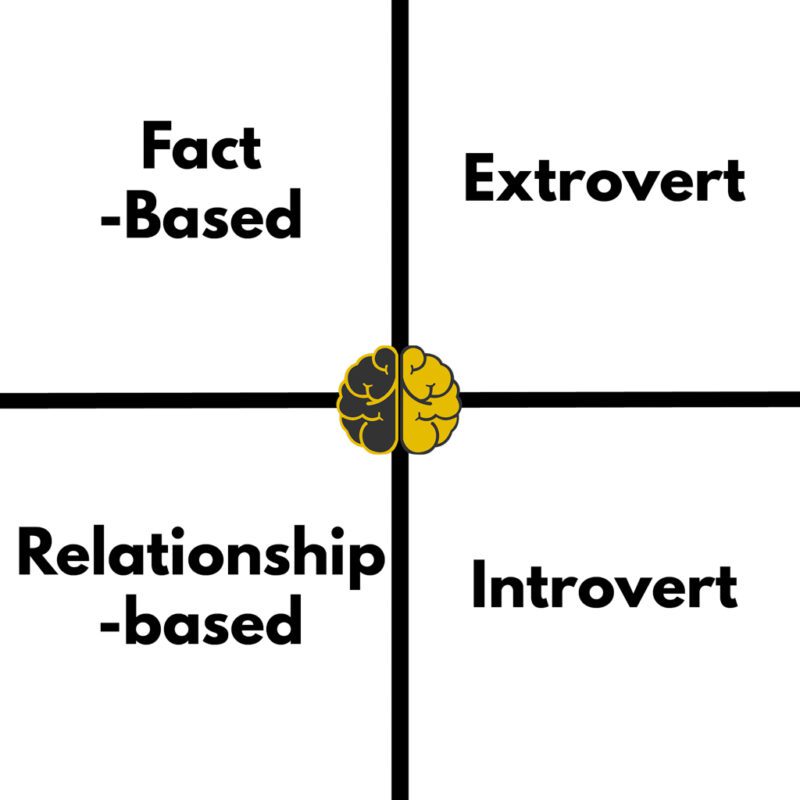According to semi-private training expert Brian Bott, you’ll find four primary personality types in your gym.
In this series, I’ll share how Bott approaches each when he’s selling them a training plan, programming and coaching their workouts, and managing them as staff.
First, a diagram—the characteristics on the left combine with those on the right to create four groups:

Below, I’ll list some characteristics of each
The Fact-Based Introvert
- Very analytical.
- Has done all the research.
- Obsessed with data.
- ”Perfectionist.”
- Can struggle with decision making if given too much data.
- Most likely to read your 20-page blog post on Zone 2 training.
The Fact-Based Extrovert
- Very strong personality.
- Loud, wants to be in control.
- Can come across as stubborn or arrogant.
- Likes to take the lead.
- Straight to the point.
- Makes decisions quickly and assertively.
The Relationship-Based Introvert
- Very calm, laid back, not easy to excite.
- Biggest fear would be upsetting anyone.
- Doesn’t care who wins as long as no one gets hurt.
- Doesn’t like independent activities.
- Wants to ”be just like everyone else.”
The Relationship-Based Extrovert
- The life of the party.
- Great motivator of groups.
- Great storyteller.
- People pleaser.
- Tends to run late with 100 things always going on.
- Can get bored, won’t always pay attention to explanations.
- Sometimes struggles to get things done due to excitement and stimulation.
Selling to the Four Personalities
Let’s start with how to get each type signed up. In the next post, I’ll share Brian’s advice on programming and coaching each type. And after that, I’ll explain how to manage these folks.
Fact-Based Introvert
These people are analytical. They’ve done the research. They want to know exactly what they’re going to do. They might know more about your product than you do.
When you ask, “How did you hear about us?” they’ll tell you they’ve been following your stuff for a while.
Sometimes they might sound negative because they question everything, but they’re actually trying to identify and solve problems. This makes it hard for them to make decisions.
Laying out the data will help convince them. Instead of talking about “the burn” or how they’ll feel, you must explain to them why strength training and protein consumption will help them lose weight.
Fact-based introverts fear being taken advantage of and will want to know about policies.
Don’t overwhelm these people. Be clear: “Based on my research, here’s what’s best for you.” Use phrases like “as you know … .”
Paralysis by analysis will prevent progress. Ask “which piece specifically do you need more information on?” and then respond right away.
Fact-Based Extrovert
These people have super-strong personalities. They know what option they want when they walk in. They probably serve in a management role at work, and they enjoy feeling like they’re in charge.
Over-explaining your options will turn these people off. They want to know what it costs, when they can come to classes, who their coach will be and how they can get started as soon as possible.
Use phrases like “you know what works best for you!” to shoehorn them into starting. Let them pick their path to start. Review their goals after 90 days and guide them to make one small change. Basically, you must get out of their way.
I’ve screwed this up by trying to prove how smart I am and taking an hour to explain our process when fact-based extroverts really just want to pay and get started.
Relationship-Based Introvert
Very quiet, laid back. It’s hard to get them excited about anything. Their lack of visible energy might make it appear as if they don’t care.
“Hey, you’re going to fit right in. This is where most of our members started when you came in.”
Tone matters: Keep a confidential tone instead of being overly exuberant. They care a lot but they’re not excitable. They also don’t like independent activities.
You want to show them they’re going to feel right at home, that they’ll be ready. Say things like this: “All of our members started this way and got some extra help. You’re going to meet people and fit right in. We will start with on-ramp and take great care of you before we introduce you to something else.”
Their greatest fear is looking stupid by trying something for the first time in front of others. These are not people with whom you want to do a functional movement screen because they’ll feel like “I can’t do this.” When dealing with relationship-based introverts, provide quick wins right away instead of finding problems to fix.
Relationship-Based Extrovert
These are loud, high-energy people—the social butterflies.
These people want to be in class with their friends, and they don’t want to be left out: “You want to do exactly what your friends are doing, right? They’re here three times a week.”
If they really want to be with their friends, get them started right away and then change their prescription over time to make it perfect. If they’re already headed in one direction, keep them going in that direction even if it’s not optimal. You can make adjustments over time as you strengthen the relationship and build trust.
Relationship-based extroverts have the highest churn because they’re regularly going to be attracted to new things.
Why Tailor Sales Pitches?
Remember: If you can’t sign them up, you can’t coach them.
Knowing a prospective client’s personality type will help you get them started, and that’s the first step to helping them become fitter and healthier.
Other Media in This Series
“The Four Personalities: Tailored Coaching and Programming”
“How to Be a CEO: Leading the Four Personalities on Your Team”

